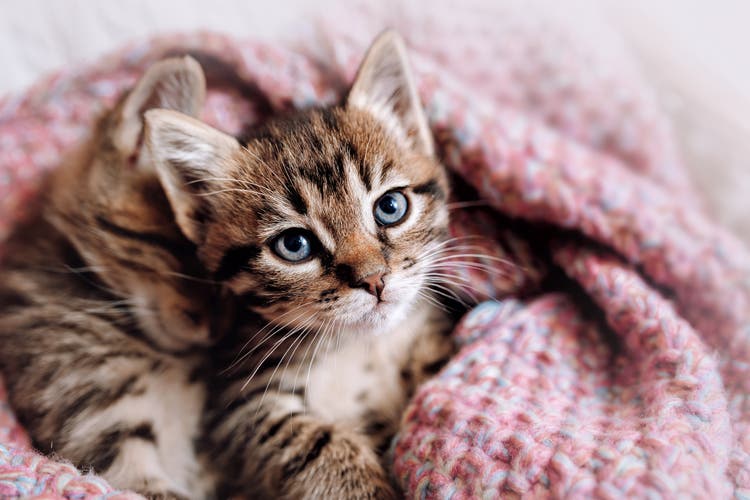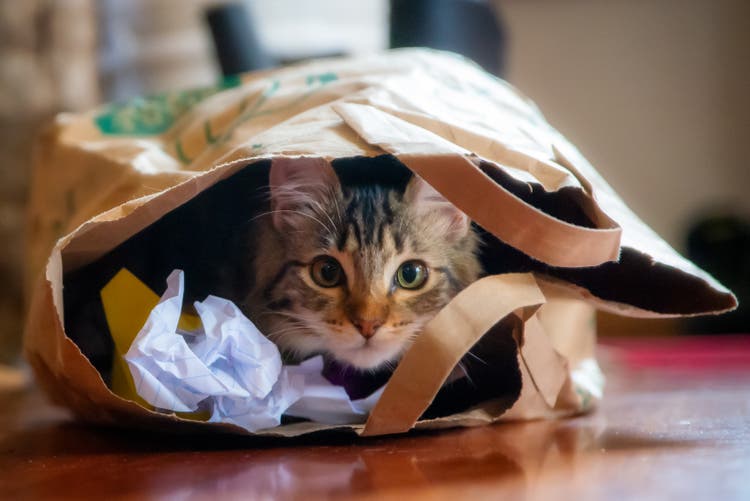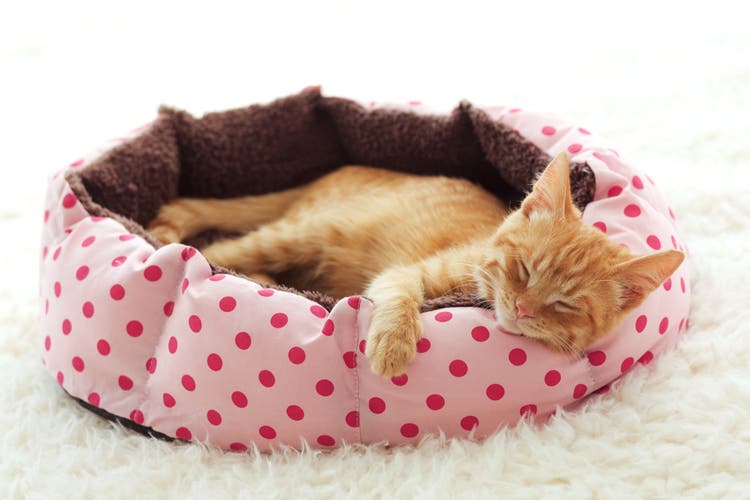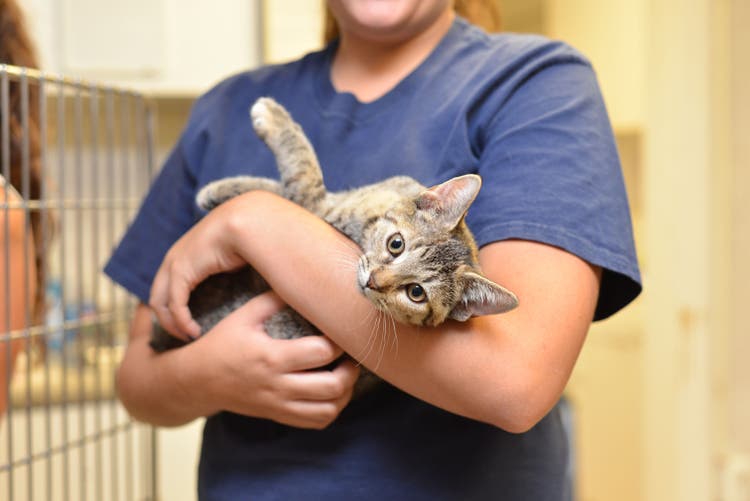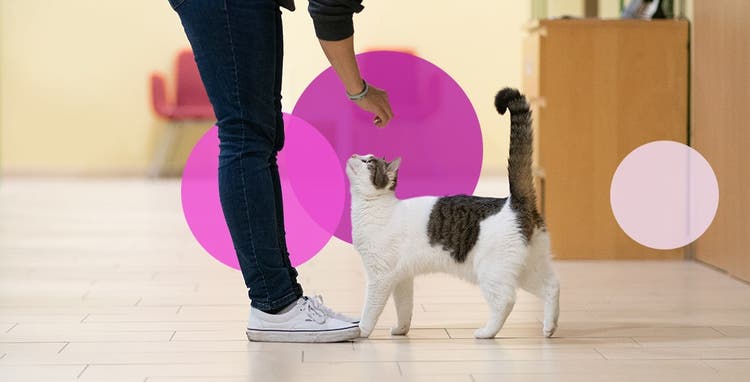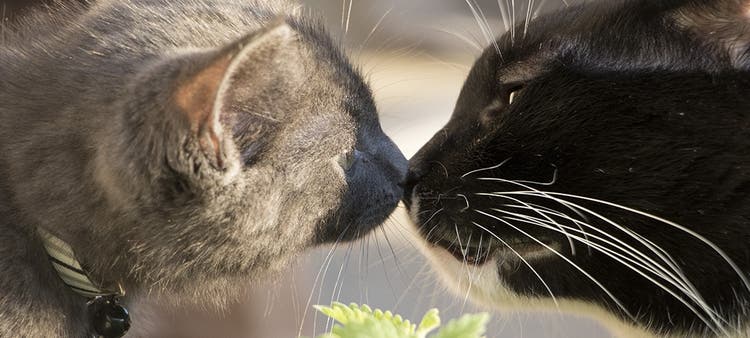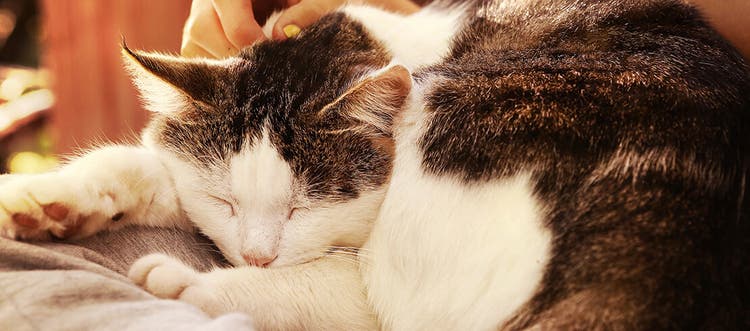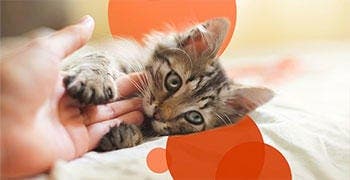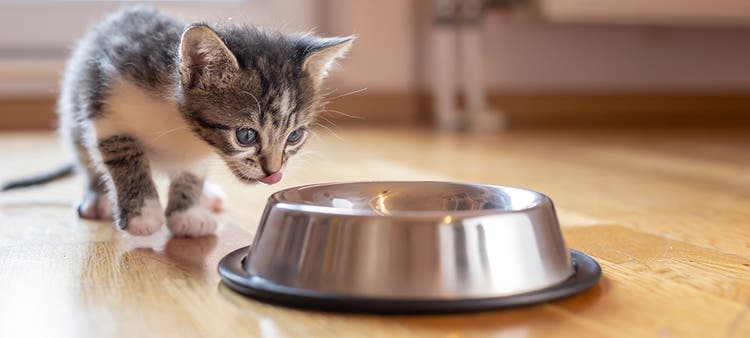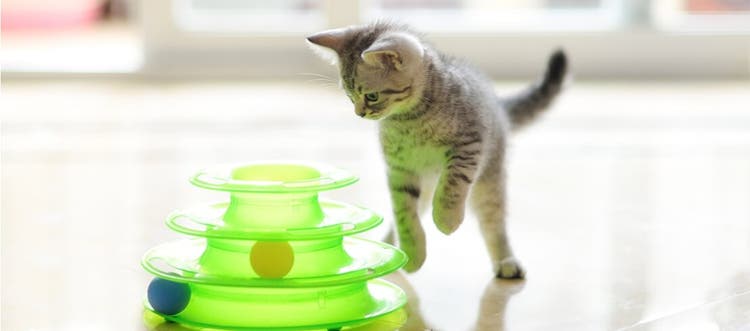Milestones for kitten development.
Sometimes it's hard to believe how fast a kitten grows into a cat. One moment they're tiny creatures that can't open their eyes, and the next they're curious, active and very independent. It often feels like a whirlwind because many important developmental factors happen in a kitten's first eight weeks of life.
How to Tell How Old a Kitten Is
Your kitten goes through several growth stages quickly. The kitten weight and development timeline below details what you can expect during the important stages in their first eight weeks of life — and can help you keep track of how old your kitten is. Here's what you can expect:
Newborn Kitten
- Physical development: Newborn kittens are so tiny that they fit in the palm of your hand. Their eyes and ears aren't open, their claws are nonretractable and they have no teeth or gag reflex. The umbilical cord falls off their stomach three days after they're born.
- Behavioral development: Since newborn kittens can't see or hear, they can only explore the world through scent. These tiny creatures seek comfort and warmth, so it's important to keep them close to their mother.
- Average weight: 3 to 5 ounces
- Things to keep in mind: The first 18 hours are critical for a kitten to receive antibodies from their mother. If this doesn't happen, they will be at a higher risk of infection until about six weeks of age. If the kitten is an orphan, bottle feed them with kitten formula every two to four hours.
Week 1
- Physical development: At the beginning of the first week, your kitten still won't have opened their eyes, unfolded their ears or grown teeth. By the end of the first week, their ear canals open and their ears begin to unfold.
- Behavioral development: Expect your kitten to sleep for most of the day, but they should wiggle their limbs and may let out a small cry if you handle them. Kittens at this stage spend close to four hours a day suckling their mother, and may purr with contentment while doing so.
- Average weight: 5.3 to 7 ounces
- Things to keep in mind: While it's tempting to open the kitten's eyes for them during the first week, be patient and allow them to open naturally. This usually happens in week two.
Week 2
- Physical development: It's finally time to see your kitten's baby blue eyes! All kittens' eyes start out blue, changing to their adult color later. Their sight, however, isn't fully developed.
- Behavioral development: Your kitten will probably attempt to crawl or take a few tentative steps, though they will be slightly wobbly.
- Average weight: 7 to 10.5 ounces
- Things to keep in mind: Since your kitten's vision isn't completely developed, keep them away from bright lights.
Week 3
- Physical development: Your kitten's ears and eyes should now be open. During this week, your kitten's first teeth - the incisors - will likely come in, and their sense of smell will fully develop.
- Behavioral development: Week three is time for exploration as your kitten's coordination improves rapidly. They begin walking and may even investigate the litter box. They also make some attempts to groom or clean themselves.
- Average weight: 8.8 to 14 ounces
- Things to keep in mind: If your kitten seems ready for the litter box, introduce them to it, ensuring it's filled with a few inches of natural, nonclumping litter or shredded newspaper.
Week 4
- Physical development: Your kitten's sight and hearing have probably noticeably improved. Their canine teeth start coming in and their claws will be retractable.
- Behavioral development: This week is when you can look forward to playing with your kitten. They're much more mobile and reactive to their surroundings.
- Average weight: 10.5 ounces to 1.1 pounds
- Things to keep in mind: If you haven't yet introduced your kitten to the litter box, now's a good time to start. For playtime fun, you can also introduce toys.
Week 5
- Physical development: Your kitten's premolars come in, which means they are ready to wean onto wet food. Once they are ready to wean, you can attempt to determine the sex of your kitten — but your vet may need to assist.
- Behavioral development: Playtime becomes even more fun as your kitten grows more confident and social. They are also acquainted with using the litter box.
- Average weight: 12.3 ounces to 1.3 pounds
- Things to keep in mind: To wean your kitten, provide plenty of "slurry," which is a mix of kitten formula and wet cat food, and sometimes bits of dry kitten food. Make sure they still have access to their mother's milk (or a bottle of formula for orphaned kittens).
Week 6
- Physical development: This is a big week for your kitten, as they reach their final stages of early development. Their last teeth come in and their eyes and ears are fully developed.
- Behavioral development: Your kitten becomes even more confident and curious by week six. This is when they become coordinated enough to land on their feet when jumping.
- Average weight: 14 ounces to 1.6 pounds
- Things to keep in mind: Bring your kitten to the vet for their first round of FVRCP vaccine, which protects them from rhinotracheitis, calicivirus and panleukopenia. You can also trim your kitten's claws for the first time.
Week 7
- Physical development: Your kitten's eye color changes to its permanent adult color. By now, kittens can maintain their own body temperature.
- Behavioral development: By week seven, your kitten is very playful and energetic. Expect lots of leaps across the floor.
- Average weight: 1 to 1.75 pounds
- Things to keep in mind: This is the ideal time to introduce your kitten to a scratching post or other fun toys.
Week 8
- Physical development: Your kitten's primary development is complete.
- Behavioral development: Your 8-week-old kitten is agile, coordinated and energetic.
- Average weight: 1.1 to 2 pounds
- Things to keep in mind: Bring your kitten to your vet to administer a booster for their FVRCP vaccine and address any other medical concerns. Your vet may recommend deworming your kitten or treating for ear mites.
From teething to meeting other pets, seeing your tiny ball of fur grow into an adolescent and, eventually, a full-grown adult cat is a fun and exciting process. While watching them grow and develop is an important part of kitten ownership, so is showering them with love and affection for years to come.
Related Articles

New Cat or Kitten: Our Downloadable Guide
Thinking about adding a feline to the family? There are so many emotional, social and physical benefits to owning a cat. Check out our free guide, also available to download!
